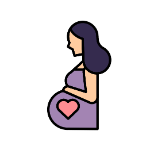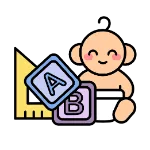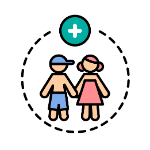
Newborn Activity
A Day In The Life Of A Newborn
6 min | Updated on 28-01-2022 by HappyPreggie
Sleep, eating, crying, and poop are considered to be the primary activities of newborns. Cuddling and playtime will be part of your day as you and your baby begin to know each other and bond in your early days together. All babies are unique; their eating and sleeping habits fluctuate frequently, and it may take time for them to settle into a routine.

(Image credits to Canva)
You may wish that your daily activities match those of your newborn. Alternatively, you might begin by establishing a very basic schedule. In either case, your baby and you will fall into a routine of sleeping, nursing, and playing. Let’s dig into A day in the life of a newborn!
After only an hour or two of being awake, new newborns usually get tired. Your kid will nap for about 16 hours per day in the first few weeks, frequently in 2- to 4-hour stretches at any time of day or night. Most babies fall asleep while eating or sucking, which is quite normal.

(Image credits to Canva)
A sleepy baby shows indicators such as yawning, drooping eyelids, looking away, fussing, and eye rubbing. Always put your child to sleep on their back, on a solid sleep surface, in a crib or bassinet with nothing but a mattress and a securely fitted sheet. By the end of the first month, babies sleep for a longer period of time. However, it will take a few more months for your baby to develop a consistent nap schedule.
Each day, newborns need eight-12 diapers or more. At this stage, your baby's poop will be thick, black, or dark green for the first week or two. That substance is called Meconium, and it was in their intestines before they were born. Their poop will become mushy and runny once that is out of their system. If you breastfeed them, their poop will be light yellowish and seedy in appearance. It will be firmer and tan or yellow in color if they ingest the formula.

(Image credits to Canva)
The pooping decreases after a few weeks. Formula-fed newborns should poop at least once a day, however, breastfed babies can spend a week without having a bowel movement.
The majority of babies will need to be fed every 1 1/2 to 3 1/2 hours. Their eating pattern determines whether you're breastfeeding or giving your baby formula. Breastfed newborns feed more frequently than formula-fed babies because breast milk is digested more quickly.

(Image credits to Canva)
There are a number of ways for babies to express that they are hungry. If you softly massage your baby's face, they may make sucking motions, put their hands or fingers in their mouth, or turn their head toward you and open their mouth. When babies want to eat, they cry, although it's usually a late indication of hunger.
Burp your little one during and after their feeding. If they stop feeding and fall asleep or if they tilt their head away from the bottle it’s an indication that they've eaten enough. If they weep at the end, it could indicate that they want more. Also, keep a burp cloth on hand because most newborns spit up after feedings on occasion.
Newborns have short intervals of becoming awake and alert in between their feeding, resting, and diaper changes. This is an excellent opportunity to interact with them. In this stage your baby gradually picks up on the sound of your voice, seeing your face, and feeling your touch.

(Image credits to Canva)
Smile, sing, read, and chat to them, sway with them to music, imitate funny faces, and provide intriguing objects for them to feel and look at. Babies do not require toys at this age; your face and eyes, your baby's hands and feet, and simple objects such as a rattle, shatterproof mirror, or colorful scarf will provide ample entertainment.
This is also the time to start your baby on tummy time. A few minutes of playtime on their stomach each day will help them strengthen their head and neck muscles and develop the coordination they'll need to roll over and crawl, which are two of their next significant milestones.
Crying is the main mode of communication for newborns, especially in their early stages. The cries can be difficult to understand, but you can find out what's wrong by reflecting on their schedule or circumstances. If it's been more than two hours since they last ate, they're probably hungry. They're probably overdue for sleep if they've been awake for an hour and a half. Babies might also become bored or overstimulated as a result of their reasons.

(Image credits to Canva)
Approximately one out of every ten babies cries for more than three hours every day. You might notice that your baby cries more in the afternoon or early evening than at other times of the day. Check if your baby is hungry, weary, or uncomfortable when they cry. Your infant may require feeding, calming to sleep, a clean nappy, or be too hot or chilly. They could be scared, in need of a hug, enthusiastic, or overtired.
You'll begin to recognize different types of crying and what they represent as you get to know your baby better. Responding to your baby's cries is a vital component of building trust and bonding with your child.
How was the blog A day in the life of a newborn? We hope you liked your blog. In HappyPreggie you will get all sorts of content apart from important guides and tips on pregnancy, childcare, health, and wellness to fun facts and many more!
If you like to read more, we would suggest you read- Tips On How To Increase Your Breast Milk Supply Naturally or you can also read- A Complete List Of Postpartum Care Essentials For Recovery.
(Image credits to Canva)
You may wish that your daily activities match those of your newborn. Alternatively, you might begin by establishing a very basic schedule. In either case, your baby and you will fall into a routine of sleeping, nursing, and playing. Let’s dig into A day in the life of a newborn!
#1 Sleeping
After only an hour or two of being awake, new newborns usually get tired. Your kid will nap for about 16 hours per day in the first few weeks, frequently in 2- to 4-hour stretches at any time of day or night. Most babies fall asleep while eating or sucking, which is quite normal.
(Image credits to Canva)
A sleepy baby shows indicators such as yawning, drooping eyelids, looking away, fussing, and eye rubbing. Always put your child to sleep on their back, on a solid sleep surface, in a crib or bassinet with nothing but a mattress and a securely fitted sheet. By the end of the first month, babies sleep for a longer period of time. However, it will take a few more months for your baby to develop a consistent nap schedule.
#2 Diapers
Each day, newborns need eight-12 diapers or more. At this stage, your baby's poop will be thick, black, or dark green for the first week or two. That substance is called Meconium, and it was in their intestines before they were born. Their poop will become mushy and runny once that is out of their system. If you breastfeed them, their poop will be light yellowish and seedy in appearance. It will be firmer and tan or yellow in color if they ingest the formula.
(Image credits to Canva)
The pooping decreases after a few weeks. Formula-fed newborns should poop at least once a day, however, breastfed babies can spend a week without having a bowel movement.
#3 Feeding
The majority of babies will need to be fed every 1 1/2 to 3 1/2 hours. Their eating pattern determines whether you're breastfeeding or giving your baby formula. Breastfed newborns feed more frequently than formula-fed babies because breast milk is digested more quickly.
(Image credits to Canva)
There are a number of ways for babies to express that they are hungry. If you softly massage your baby's face, they may make sucking motions, put their hands or fingers in their mouth, or turn their head toward you and open their mouth. When babies want to eat, they cry, although it's usually a late indication of hunger.
Burp your little one during and after their feeding. If they stop feeding and fall asleep or if they tilt their head away from the bottle it’s an indication that they've eaten enough. If they weep at the end, it could indicate that they want more. Also, keep a burp cloth on hand because most newborns spit up after feedings on occasion.
#4 Playing
Newborns have short intervals of becoming awake and alert in between their feeding, resting, and diaper changes. This is an excellent opportunity to interact with them. In this stage your baby gradually picks up on the sound of your voice, seeing your face, and feeling your touch.
(Image credits to Canva)
Smile, sing, read, and chat to them, sway with them to music, imitate funny faces, and provide intriguing objects for them to feel and look at. Babies do not require toys at this age; your face and eyes, your baby's hands and feet, and simple objects such as a rattle, shatterproof mirror, or colorful scarf will provide ample entertainment.
This is also the time to start your baby on tummy time. A few minutes of playtime on their stomach each day will help them strengthen their head and neck muscles and develop the coordination they'll need to roll over and crawl, which are two of their next significant milestones.
#5 Crying
Crying is the main mode of communication for newborns, especially in their early stages. The cries can be difficult to understand, but you can find out what's wrong by reflecting on their schedule or circumstances. If it's been more than two hours since they last ate, they're probably hungry. They're probably overdue for sleep if they've been awake for an hour and a half. Babies might also become bored or overstimulated as a result of their reasons.
(Image credits to Canva)
Approximately one out of every ten babies cries for more than three hours every day. You might notice that your baby cries more in the afternoon or early evening than at other times of the day. Check if your baby is hungry, weary, or uncomfortable when they cry. Your infant may require feeding, calming to sleep, a clean nappy, or be too hot or chilly. They could be scared, in need of a hug, enthusiastic, or overtired.
You'll begin to recognize different types of crying and what they represent as you get to know your baby better. Responding to your baby's cries is a vital component of building trust and bonding with your child.
How was the blog A day in the life of a newborn? We hope you liked your blog. In HappyPreggie you will get all sorts of content apart from important guides and tips on pregnancy, childcare, health, and wellness to fun facts and many more!
If you like to read more, we would suggest you read- Tips On How To Increase Your Breast Milk Supply Naturally or you can also read- A Complete List Of Postpartum Care Essentials For Recovery.
Join the largest support network for family health and well-being. Ready to get started?
Get started
















